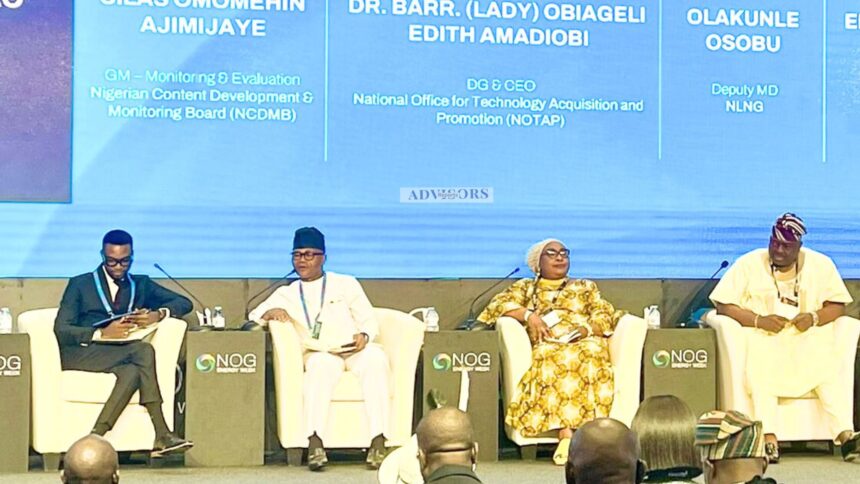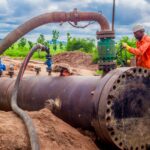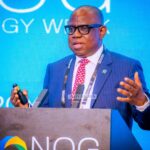…advocates technology domestication in Nigerian languages to solve industry issues
… confirms as Train 7 nears completion
Oredola Adeola
The Nigeria LNG (NLNG) has called for the domestication of technology in Nigeria’s oil and gas sector, warning that reliance on foreign languages hinders full technological development.
The gas company, which is a major player in the global LNG business, has therefore urged the Nigerian Government and the NCDMB to promote local adoption to avoid missing out on the full potential of Artificial Intelligence.
Mr. Olakunle Osobu, NLNG’s Deputy Managing Director, made this known in his submission whole speaking at the 2025 NOG Energy Week’s Strategic Panel Session on the theme “Technology as a Local Content Imperative: From Adoption to Domestication.”
He stated that the oil and gas sector, and especially Artificial Intelligence, are too vital to be developed solely in foreign languages when Nigeria’s own linguistic resources remain underutilized.
Osobu emphasized the urgent need to move beyond merely adopting foreign technologies toward truly embedding and developing them locally.
“We are committed to promoting the sector through technology.
“Using IT, we need to be very precise in our operations. We are focused not just on building technology, but on the deliberate adoption and domestication of it,” he stated.
According to him, the current over-reliance on advanced academic degrees to interpret technology is limiting and must be addressed.
“Until we see localized technology as a national asset, we will continue to struggle. There’s a need to avoid limiting the capacity to interpret technologies to those with bachelor’s or Ph.D. degrees.
“We need to bring it down to a level where everyone can understand the terminologies, through Nigerian indigenous languages,” he noted.
Osobu stated that, “Today at NLNG, over 90 percent of our contractors are Nigerian. These companies, staffed by Nigerians, have deployed technology for years and some of them are currently working on the Train 7 project.”
He argued that Nigerian talent should not only lead within the country but also extend expertise to other oil and gas-producing African nations.
“No country has ever developed by learning technology in a foreign language.
“In Nigeria, we do not have any algorithm written in any of our indigenous languages. If we’re not careful, we will miss out on the entire spectrum of Artificial Intelligence,” he said
Osobu called for deliberate action to start writing algorithms and even cryptographic codes in local languages, citing the power of linguistic relevance in machine learning and AI development.
“Using English keywords to write technology is limiting. AI will respond to local issues only if we domesticate its algorithms in our indigenous languages,” he stated.
He emphasized that AI systems cannot fully understand local realities unless developed in local languages.
Therefore, “every system coming into Nigeria must come with our indigenous languages. It has to be written in Nigerian languages, for instance, we can start using Swahili or Hausa in keyboards.”
According to him, technology must be democratized to ensure access for all citizens, regardless of their formal education level.
“We will continue to promote and work with policymakers to domesticate all the technologies we have deployed over the years, such that you do not need to be a Bachelor’s degree holder or Ph.D. holder to interact with our systems.”
He challenged the long-held notion that English proficiency equates to intelligence or technical capability.
“Gone are the days when English was used as the dominant language and a measure of intelligence. That should no longer determine one’s ability to write code or use technology.”
Osobu urged the Nigerian Content Development and Monitoring Board (NCDMB) to collaborate with research institutes and universities to encourage developers to begin coding in local languages.
“We have been promoting local content, but it’s time to take it to the next level by domesticating technology. Technology is not a difficult thing to know; all you need is the ability to read and write.
“Gone are the days when your ability to speak English was seen as a form of brilliance, ”Osobu said.
He further noted that Nigeria successfully delivered Trains 1–6 with strong participation from local contractors.
According to him, NLNG is now leveraging the capabilities of vendors who had previously worked on Trains 1-6 to accelerate the completion of Train 7.
“In building the six trains, we had Nigerians working on them. So, when Train 7 came up, we already had enough local expertise,” he said.
NLNG’s Deputy MD emphasised that the project’s leadership, including its directors, are Nigerians—further demonstrating the maturity of local content in the sector.




